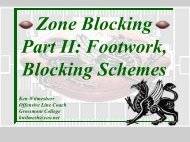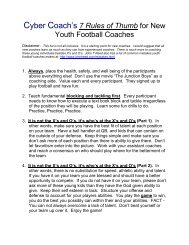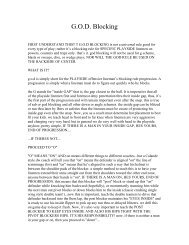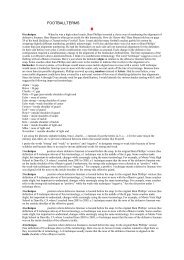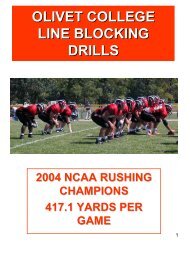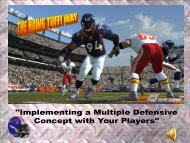Ten Qualities of a Successful Coach - Hawg Tuff
Ten Qualities of a Successful Coach - Hawg Tuff
Ten Qualities of a Successful Coach - Hawg Tuff
Create successful ePaper yourself
Turn your PDF publications into a flip-book with our unique Google optimized e-Paper software.
Head <strong>Coach</strong> Mike Krzyzewski speaks to<br />
the players after a scrimmage during<br />
USA Senior Mens National Team practice<br />
<strong>Ten</strong> <strong>Qualities</strong> <strong>of</strong> a<br />
<strong>Successful</strong> <strong>Coach</strong><br />
By Steve Pavlovic, Basketball <strong>Coach</strong>es Coordinator<br />
St. Cyril and Methodius Catholic School, Lemon, IL<br />
w hether<br />
coaching a<br />
child's youth<br />
team, a junior<br />
high school team,<br />
a high school team, or a college team,<br />
coaches require the same kind <strong>of</strong><br />
qualities to be successful.<br />
In my 22 years <strong>of</strong> coaching youth<br />
sports, I believe I can list the 10 qualities<br />
that will assure success on both<br />
the coaching and playing levels.<br />
#1 PATIENCE<br />
The younger the players, the more<br />
patience you must have. You cannot<br />
expect everyone to latch on to the<br />
skill being taught at the same time.<br />
Your challenge will be to get them to<br />
pay attention to you and follow your<br />
instructions. For those who don't,<br />
you must leave a reminder <strong>of</strong> the reason<br />
they are there.<br />
#2 DISCIPLINE<br />
In addition to patience, you must<br />
also maintain control <strong>of</strong> the team.<br />
You don't want anyone go<strong>of</strong>ing<br />
around and distracting the rest <strong>of</strong> the<br />
team. Sure, everyone wants to have<br />
fun. But the main objective is to<br />
leam how to play the sport.<br />
For those who are misbehaving,<br />
you can add extra drills or talk with<br />
their parents about their behavior.<br />
You must take control <strong>of</strong> the situation<br />
immediately—letting the players<br />
know that you will not tolerate disobedience.<br />
If you don't take control, your<br />
players are not going to take your<br />
discipline seriously. ! don't mean<br />
that you have to be a tyrant. Just let<br />
them know what you expect <strong>of</strong> them,<br />
namely their attention and effort, and<br />
stay consistent.<br />
#3 BE FAIR<br />
Treat everyone on your team<br />
equally. Team rules are meant for<br />
everyone, not just some players. The<br />
quickest way to cause dissention is to<br />
let one player get away with something,<br />
and then punish another who<br />
has done the same thing.<br />
Even if the player is your child, he<br />
or she must follow the same rules as<br />
everyone else: We have no stars on<br />
the team. Everyone receives the<br />
same treatment. Treat them all the<br />
same, whether complimenting them<br />
or correcting them, and you will earn<br />
the respect <strong>of</strong> all <strong>of</strong> them.<br />
#4 COMMITMENTS<br />
When you decide to become a<br />
coach, you are making a commitment<br />
to a team. A team that is depending<br />
on you and looking at you as its leader<br />
and resident "expert" on the sport.<br />
Don't let them down! Show that<br />
you are committed to them by<br />
always being at practice, being<br />
enthusiastic, and showing concern<br />
for their development.<br />
Always follow your own rules.<br />
When you tell the players to be at a<br />
practice or game at a certain time,<br />
make sure you are also there on time.<br />
1 always try to show up at least 20<br />
minutes early. Being on time is a<br />
practice that will be useful to everyone<br />
throughout his or her lives. Show<br />
them that it is important to you, too.<br />
If you are consistently late, your players<br />
will begin thinking, "If coach isn't<br />
on time, why should I be?" Show<br />
that you are committed to the entire<br />
team by doing as you say.<br />
58 APRIL 2OO7 COACH AND ATHLETIC DIRECTOR
#5 LEAD BY EXAMPLE<br />
Being on time is an excellent way<br />
to lead by example. But thea* are<br />
many others ways. You must realize<br />
that your kids art* watching your<br />
every move. If they see you perform<br />
a questionable act, they may also<br />
think it is OK for them to do it.<br />
You must be mindful <strong>of</strong> this at all<br />
times, whether it's during a game or<br />
at a practice. You want your players<br />
to follow your attitude and demeanor.<br />
If you are going to constantly yell<br />
at an <strong>of</strong>ficial or referee during a game,<br />
your players will pick up on that. If<br />
you do it, it must be alright for them.<br />
We as adults know that this isn't the<br />
case, yet we continually see coaches<br />
do it and then be followed by the<br />
players doing the same thing and<br />
complaining to the <strong>of</strong>ficials.<br />
That is not what you want your<br />
team to be doing. Remember to handle<br />
yourstif in an adult manner. You<br />
must always ask yourself, "Are my<br />
actions going to benefit my players?"<br />
This includes the language that you<br />
use, how much yelling you do at<br />
practice and games, and how well<br />
you maintain your composure.<br />
#6 BE WILLING TO LEARN<br />
Never think that you know all<br />
there is to know about a sport. Even<br />
after all the years I have coached, I<br />
am still learning different techniques,<br />
always trying to improve<br />
myself as a coach.<br />
Many coaches assume that they<br />
know all there is to know, either<br />
because they played the game in high<br />
school or have seen it on TV.<br />
Don't get caught in this trap.<br />
Check out sports shows on TV, read<br />
books at the library, or go to a bookstore<br />
to increase your knowledge.<br />
If clinics are available, try to participate<br />
in them. Take advantage <strong>of</strong><br />
the knowledge <strong>of</strong> veteran coaches. I<br />
help supervise basketball coaches in<br />
our sports program, and I try to pass<br />
along tips to our newer coaches. This<br />
in tum helps them with their players.<br />
Don't let your ego get in the way.<br />
If you don't understand a skill, ask a<br />
veteran coach or refer to some other<br />
source for the answer. Always<br />
remember, you are there to help your<br />
players leam.<br />
#7 KEEP EVERYONE<br />
INVOLVED<br />
Whether it's a practice or a game,<br />
don't have anyone sitting on the sidelines<br />
for an extended period <strong>of</strong> time.<br />
Obviously, there will be times when<br />
you're working on things like an<br />
<strong>of</strong>fense, with just a set number <strong>of</strong><br />
players. That's fine.<br />
But you have to get everyone<br />
involved at some point. When you<br />
fail to involve a person, you may not<br />
only hurt that individual, but also<br />
the team.<br />
How does it hurt the team? Well,<br />
if that player doesn't know the<br />
<strong>of</strong>fense you are rurming because he<br />
hasn't been involved in a practice,<br />
how will he know it when he plays in<br />
the game?<br />
Keeping everyone involved in drills<br />
and games will help everyone develop<br />
a sense <strong>of</strong> accomplishment no matter<br />
what their skill level.<br />
#8 BE THICK-SKINNEO<br />
One <strong>of</strong> the downsides <strong>of</strong> coaching<br />
is being criticized. For a new coach,<br />
this can be devastating. 1 can remember<br />
the first time I heard about a few<br />
parents questioning my strategy during<br />
a game.<br />
I can tell you, it hurt my feelings.<br />
Then it made me angry. But I sat<br />
down with a few veteran coaches,<br />
and they set me straight.<br />
All they did was ask one simple<br />
question: "Are you doing what is in<br />
the best interest <strong>of</strong> your players, helping<br />
them develop?" If you are, then<br />
don't worry about it when anyone<br />
else disagrees!<br />
That simple piece <strong>of</strong> advice has<br />
stayed with me all these years. So do<br />
your best as a coach, and ignore any<br />
misinformed comments from parents<br />
or fans.<br />
#9 PERFORM THE SKILLS<br />
OF THE SPORT<br />
Since you will be called upon to<br />
demonstrate drills to your players,<br />
you must be able to do them. This<br />
only makes sense. Take the time to<br />
work on it, whether it is in the gym,<br />
on the field, or wherever. I've seen a<br />
team lose confidence in their coach<br />
because <strong>of</strong> this. Why would you listen<br />
to a coach tell you about shooting,<br />
when he can't demonstrate it the<br />
right way? Show your players the<br />
way you want something done, and<br />
earn their respect in the process.<br />
#10 HAVE A PRACTICE PLAN<br />
Practice time is very important,<br />
and there never seems to be enough<br />
<strong>of</strong> it. So make sure you don't waste<br />
any <strong>of</strong> it. Take the time to write up a<br />
plan before practice. Consult your<br />
assistants, too, so that they have input<br />
and know what will be going on during<br />
practice. It will make for a much<br />
smoother practice, with much more<br />
being accomplished.<br />
<strong>Coach</strong>ing is a big responsibility,<br />
but a very rewarding one. Take the<br />
time to follow this list and you'll do<br />
just fine. The best part <strong>of</strong> coaching is<br />
watching a player and team develop<br />
over the course <strong>of</strong> a season. Make it<br />
interesting for the players; yet make<br />
sure they leam a lot too. Sports<br />
should be enjoyable for everyone! •<br />
Steve Pavlovic is a youth basketball coach<br />
at SL Cyril and Methodius Catholic School<br />
in Lemont, IL. He has coached for the past<br />
22 years at all levels from 4th grade<br />
through 8th grade, and over the past six<br />
years he has also served as the basketball<br />
coaches coordinator. He is also author <strong>of</strong><br />
several self-published e-book series on<br />
basketball skills. You can visit his site at<br />
www.scoremorehoops.com<br />
WWW.COACHAD.COM ?OO7 APRIL S9





